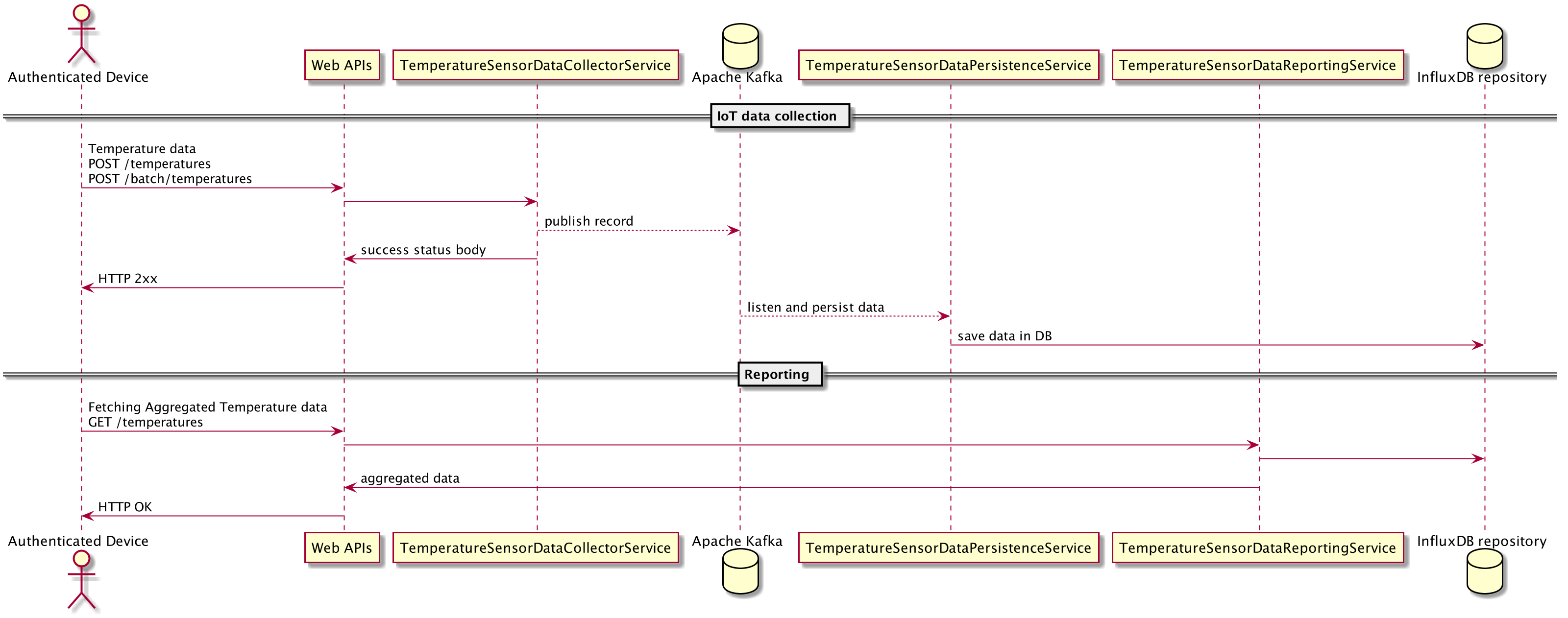This project is an assignment. Implemented code would be a nice example of real-time IoT events and how platform APIs capture and present data. In this assignment, IoT device refers to temperature sensor.
IoT Platform APIs provides
-
Collect IoT device data using HTTP endpoints.
-
Saving data point in InfluxDB.
-
Using Apache Kafka to create event stream.
-
Real-time data processing.
-
JDK 1.8 (Tested with Oracle JDK)
-
Maven 3.6.x+
-
Docker (18.09.2), Docker Compose (1.23.2)
Temperature sensor send data
curl -X POST localhost:8080/temperatures \
-H 'Content-Type: application/json' \
-d '{ "unixTimestamp": 1563142700, "temperatureInFahrenheit": 20 }'example response
{"success":true}Temperature sensor send data in batch
curl -X POST localhost:8080/batch/temperatures \
-H 'Content-Type: application/json' \
-d '[{ "unixTimestamp": 1563142701, "temperatureInFahrenheit": 21 }, { "unixTimestamp": 1563142702, "temperatureInFahrenheit": 22 }]'example response
[{"success":true},{"success":true}]Get aggregated temperature data report
curl -X GET http://localhost:8080/temperatures?startTime=1563142700&endTime=1563142800 \
-H 'Content-Type: application/json'example response
{
"deviceId":"e01a7bc8-ee40-48ba-80ee-f8acbaba5f14",
"data":[
{
"unixTimestamp":1563142700,
"temperatureInFahrenheit":20.0
},
{
"unixTimestamp":1563142701,
"temperatureInFahrenheit":21.0
},
{
"unixTimestamp":1563142702,
"temperatureInFahrenheit":22.0
},
{
"unixTimestamp":1563142795,
"temperatureInFahrenheit":24.0
}
]
}-
Authentication and authorization is not taking into consideration. LoggedInUserService.java provides mocked data.
-
When it comes to making software design decisions for IoT devices, it’s important to fit your functional requirements within the capabilities of resource-constrained devices.
-
Data stream from IoT devices collected by REST API.
-
Eventually put to Apache Kafka.
-
Persisted in storage.
-
-
Application has both Apache Kafka event producer and consumer. Separate microservice could make it more scalable.
-
Collector REST API endpoint produce event.
-
Reporting/Metrics collector services consume events.
-
-
InfluxDB is chosen because it well suited for time series data. Fast time range query makes it good choose. Caching on top of service layer could bring more speed to the APIs.
To run the unit tests, execute the following commands
mvn clean test-compile testTo run the integration tests, execute the following commands
mvn clean test-compile verify -DskipTests=trueTo run the integration tests, execute the following commands
mvn clean test-compile verify-
Improve architectural design, completed the project in 12 hours.
-
Use MQTT as default protocol, put data events directly to Apache Kafka.
-
Build docker image (plugin already added in the pom).
-
Generate and check OWASP report.
-
Improve code coverage.
-
Apache Kafka topic listener code is not covered with tests.
-
Licensed under the MIT License, see the LICENSE file for details.
